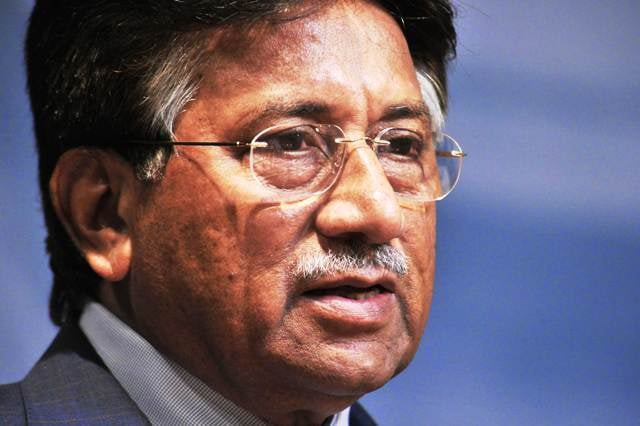Drones do technically violate sovereignty, but no deal done: Musharraf
Musharraf warns boots-on-ground in N. Waziristan would be extremely unwise, Bin Laden was negligence, humint failure.

“There is no such deal in place. There were nine drone attacks in three years [during my time]. The deal was to fight extremism and terrorism, to defeat al Qaeda and Taliban,” Musharraf clarified. Senator Graham backed him up saying “there has been no deal, we have a common interest to eliminate the threat to innocent lives and for that we need to eliminate the source of that threat”.
Graham went on to say that the partnership between Pakistan and the US was extremely crucial and both countries need to work through this difficult phase.
Musharraf added that the "drones did technically violate the sovereignty of Pakistan," and created antipathy against the US through collateral damage which had contributed to the souring relations between Pakistan and US making the strikes counterproductive. However the senator sidestepped the question saying that both sides understood that they were pursuing a common objective of eliminating the threat to innocent lives and that the drones had demonstrated to be an effective tool to accomplish while it respects the sovereignty of foreign nations.
Musharraf suggested that a solution needs to be found since the drones did provide the benefits of killing militants.
“In the final analysis, terrorism needs a political solution, but steps need to be taken to limit the loss of lives by those who are willing to take the violent route,” Graham said.
Asked whether US troops on the ground would multiply terrorism, Musharraf said that it would not be wise (for the US) to come into North Waziristan, a military excursion into the area would create a terrible mess as it would ratchet up the anti-American sentiment
Musharraf also voiced his opposition to complete fencing of the Pak-Afghan border citing the difficulty in putting up a manned fence over very rough terrain, the un-resolved legal aspect of the border complicates this. “An obstacle like a fence is not effective till it is manned. Unless it is manned, anyone with a wire cutter can get through”.
A solution, Musharraf proposed, was selective mining along with fencing in areas where applicable would be most effective, adding that 35 kilometres of the border had been fenced.
In response to a question Musharraf admitted that there was a policy error of not weaning the Pakhtoons to away from the Taliban since all Taliban were Pakhtoon. He said that the window between 2002 – 2004. Senator Graham too said that the US was not targeting the Pakhtoons.
Senator Graham also admitted that his country had made a serious mistake in ignoring Afghanistan while attacking Iraq.
Musharraf defended the ISI over the discovery of Osama bin Laden in Abbottabad, after being reminded that in his own book,' it was mentioned that a senior al Qaeda leader Al-Libbi had three safe houses in Abbottabad. Musharraf said that it was “not a case of complicity but of serious negligence and failure of human intelligence”. The former head of Pakistan’s army said that he had been monitoring all television channels of Pakistan following the raid and found that no local resident interviewed knew whether he was living there. Though many other high ranking al Qaeda leaders had been caught in Pakistani cities.
Answering a question about the future of Afghanistan, Senator Graham said that it was up to the people of Afghanistan determine the future of the country and hoped that they could find a political solution in the short window they had to establish a stable government takes over that seeks peace and economic prosperity . Musharraf said while Pakistan’s interest was in a peaceful Afghanistan, he was more interested in whether the US would be leaving lock stock and barrel in 2014 and whether Afghanistan would return to 1989 or 1996 position once that happened.
Asked about the recent statement of Karzai of Afghanistan backing Pakistan in a US vs Pakistan war, Musharraf called it preposterous and chose not to comment on it.
Defending his rule, Musharraf said that Dictator or dictatorship was “a state of mind and I was extremely democratic in my approach and introduced grass roots democracy”.
Responding to a question over his enlightened moderation campaign which has seemingly failed in today’s Pakistan, Musharraf said that it was not easy to change a mindset of 170 million people. The process required a government committed to move towards moderation along with a mixture of poverty alleviation and education along with a couple of decades and a lot of patience.



















COMMENTS
Comments are moderated and generally will be posted if they are on-topic and not abusive.
For more information, please see our Comments FAQ